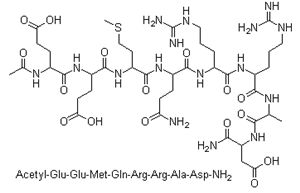Peptides offer a number of advantages over small molecules and antibodies as potential therapeutics. However, a number of key issues have hampered their use as drug candidates. These include the development of technologies that allow peptides to be viable drug candidates in areas usually restricted to protein therapeutics, such as monoclonal antibodies. These technologies include the development of peptide-conjugates that have lower rates of clearance and hence the potential to increase the exposure of peptide drug candidates in chronic diseases. Structural additions have also been made to peptides, including the use of unnatural amino acids, mainchain modifications and other novel substitutions, which have helped to improve peptide stability and further their therapeutic potential.
The development of peptide drugs has become a major focus in pharmaceutical research. This is because peptides have many advantages over traditional drugs, including smaller doses, fewer side effects, and more targeted actions. The first peptide drug, insulin, was developed in 1921 and there are now more than 80 peptide drugs on the market.
The discovery and development of insulin, a peptide with 51 amino acids, has been considered one of the monumental scientific achievements in drug discovery. It was first isolated by Frederick Banting in 1921 and further developed by Frederick and Charles Best, and was already available for patients with diabetes mellitus just a year after its first isolation. However, during the 20th century, human insulin production could not keep up with the high market demand, and animal-derived insulins, such as bovine and porcine insulin, dominated the insulin market. In 2009, recombinant insulin replaced animal-derived insulins.
Therapeutic peptides: technological advances driving peptides into development.
Peptides offer a number of advantages over other drug types, such as increased specificity and small size. However, a series of new technologies have recently been developed that allow peptides to be viable drug candidates in areas usually restricted to protein therapeutics, such as monoclonal antibodies. These technologies include the development of peptide-conjugates that have lower rates of clearance and hence the potential to increase the exposure of peptide drug candidates in chronic diseases. Structural additions have also been made to peptides, including the use of unnatural amino acids, mainchain modifications and other novel substitutions, which have helped to improve peptide stability and further their therapeutic potential.
Methods for engineering therapeutic peptides
Peptides are a class of drugs that are becoming increasingly important and influential for the treatment of many human diseases. Compared to traditional small molecule drugs, peptides have the potential for higher target specificity and potency, along with better safety profiles. However, peptides are often unstable and can be rapidly degraded by various proteases after dosing. To address these inherent problems of peptides, many different methods have been attempted.
Peptide therapeutics: current status and future directions.
Peptides are molecules that can selectively and effectively kill cells, making them a potential target for pharmaceutical research and development. Around 140 peptide therapeutics are currently being evaluated in clinical trials. However, peptide design is becoming more complex, so new approaches are being explored. These include multifunctional and cell penetrating peptides, as well as peptide drug conjugates.
Refrences:
Peptides offer several advantages over small molecules and antibodies.
Therapeutic peptides for chemotherapy: trends and challenges for advanced delivery systems.
